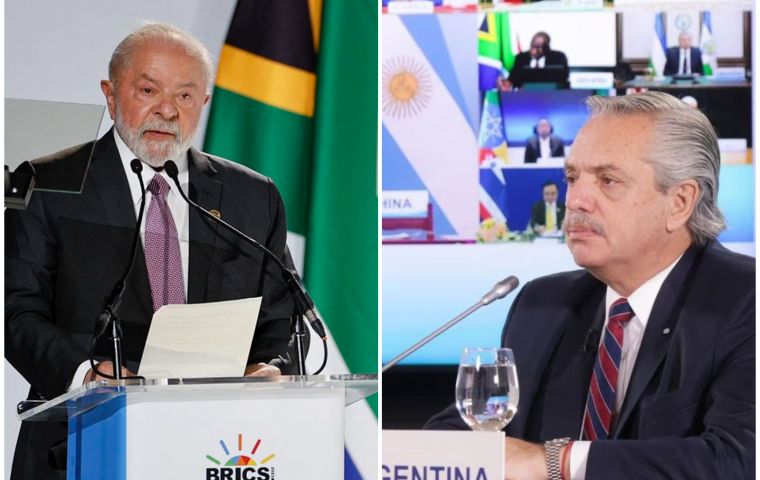MercoPress. South Atlantic News Agency
Argentina is invited to join BRICS along with six other countries
 All eyes are on Argentina, which will elect its next president on October. Milei has already announced that if elected president, he would not maintain economic relations with countries such as China
All eyes are on Argentina, which will elect its next president on October. Milei has already announced that if elected president, he would not maintain economic relations with countries such as China The BRICS group, consisting of Brazil, Russia, India, China, and South Africa, has announced its plan to expand its membership by adding six new countries, including Argentina. The decision was revealed during a press conference jointly conducted by South African President Cyril Ramaphosa and leaders from the existing BRICS nations.
As of January 1, 2024, the group's membership will extend to include Argentina, Iran, Egypt, Ethiopia, Saudi Arabia, and the United Arab Emirates. This move underscores the BRICS group's resolute commitment to catapulting emerging economies onto the global stage, amplifying their collective influence.
“Membership will take effect from January 1, 2024. With this summit, BRICS begins a new chapter,” Ramaphosa stated on Thursday as quoted by AFP.
South African officials revealed that the member countries have collectively forged an agreement on the expansion's protocols, underscoring the guiding principles, intricate guidelines, and meticulous review processes for aspirants seeking BRICS membership.
The President of Brazil, Luiz Inácio Lula da Silva, dedicated a special greeting to his Argentine counterpart, Alberto Fernández, shortly after Ramaphosa's announcement. “Brazil is pleased to welcome Saudi Arabia, Argentina, Egypt, the United Arab Emirates, Ethiopia and Iran to the BRICS”, said the Brazilian President on his X (Twitter) account.
Dedico uma mensagem especial ao querido @alferdez , presidente da Argentina e grande amigo do Brasil e do mundo em desenvolvimento.
— Lula (@LulaOficial) August 24, 2023
The United States stated that it does not see the BRICS as future “geopolitical rivals” and assured that it wishes to maintain “solid relations” with Brazil, India and South Africa.
However, all eyes are on Argentina, which will elect its next president on October 22. The most voted candidate in last week's primary elections, libertarian economist Javier Milei, has already announced that if elected president, he would not maintain economic relations with countries such as China because “he does not negotiate with communists”, as he said in recent interviews.
Read also: Agreement reached on principles for adding members to BRICS
Intricate negotiations and high-level discussions among the incumbent BRICS nations were central to the expansion decision. While China, commanding the lion's share of the group's GDP at approximately 70%, championed the move, India, another heavyweight within the alliance, approached the decision cautiously, citing concerns regarding China's regional ambitions.
“We are going to be protagonists of a common destiny,” Argentine President said in a recorded message from the Olivos residence.
“A new scenario is opening up for Argentina: we have joined the BRICS alliance,” Fernández underlined.
“We have joined the BRICS alliance and thus we take a new step in the consolidation of the fraternal Argentina open to the world that we always dreamed of, as part of the South full of hope and future. We have joined the alliance of the most important countries of the emerging economies. A new scenario is opening up for Argentina,” he added.
Indian Prime Minister Narendra Modi underscored the significance of unanimous consensus in navigating the complexities of expansion within the BRICS framework. Closed-door plenary sessions and a flurry of bilateral meetings formed the crucible of these deliberations, held during the course of the summit.
The BRICS nations reaffirmed their commitment to a “non-aligned” stance, especially in the midst of global tensions triggered by the Ukraine conflict.
Some forty nations had applied for membership or expressed their desire to join the bloc created in 2009, which represents almost a quarter of the world's GDP and 42% of the world's population.




Top Comments
Disclaimer & comment rules-

-

Read all commentsIf Argentina bails out of joining BRICKS because of the elections results, there are many other countries waiting in the wings to join...
Aug 27th, 2023 - 03:14 pm +2TWIMC...
Aug 24th, 2023 - 11:54 am +1Good to see that somebody at “MercoPress News Agency” is awake and keeping an eye on today's news...
https://en.mercopress.com/2023/08/24/agreement-reached-on-principles-for-adding-members-to-brics/comments#comment527720
Give him/her a raise..., Gus...
Commenting for this story is now closed.
If you have a Facebook account, become a fan and comment on our Facebook Page!